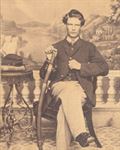
 Diaries belonging to a Civil War soldier who witnessed the assassination of President Abraham Lincoln have been digitized and published by UC Merced’s Kolligian Library.
Diaries belonging to a Civil War soldier who witnessed the assassination of President Abraham Lincoln have been digitized and published by UC Merced’s Kolligian Library.
Henry O. Nightingale was an abolitionist and Union soldier. His diary contains a firsthand account of Lincoln’s assassination at Ford’s Theatre and chronicles the following day’s chaos and sadness that enveloped Washington, D.C.
The diaries are available for the public to view online at the Online Archive of California. The soldier’s great granddaughter, Edith Denio, lives in Atwater with her husband, Mel. They had the diaries, along with a photo of the young soldier.
Nightingale was injured in May 1864 during the Battle of the Wilderness. After his injury, he spent 13 months in recovery at Stanton General Hospital in Washington, D.C.
“(I) remained all day in the Hospital,” Nightingale wrote, “in the evening attended Ford’s Theatre and in the last act, a most astonishing crime was committed the President, Mr. Lincoln, was shot through the head, the assassin then leaped out of the box, on the stage and drew a large dagger, and exclaimed ‘I have done it. Virginia is avenged. Hic semper tyrannis’ [sic] and made his escape.”
Nightingale’s letters to a pen pal are also accessible to researchers. They are part of a collection donated by the Nagy family to the Villanova University library in Pennsylvania. Staff at Villanova uncovered a claim in one letter that Nightingale had procured Lincoln’s signature the day the president was assassinated.
Steve Nagy was able to track down Nightingale’s descendants in California and learned that they had the soldier’s diaries. Nagy and the Villanova library staff reached out to Emily Lin, head of digital assets at UC Merced, to see if the family might consider digitizing the diaries for historic value. The family agreed, and Lin and her staff scanned the diaries page-by-page in high resolution.
“We did not find any signature,” Lin said, “but reading the pages still sends a chill down your back. He writes about being on the march as a soldier, and later, the emotions that came with Lincoln’s unexpected death.”
The library’s student staff members, under the oversight of library services manager Mary Weppler-Selear, are transcribing the text of the letters so they are easier to read and searchable. The project is an example of UC Merced’s mission to provide access to important historic and cultural materials for research by scholars across the world.






